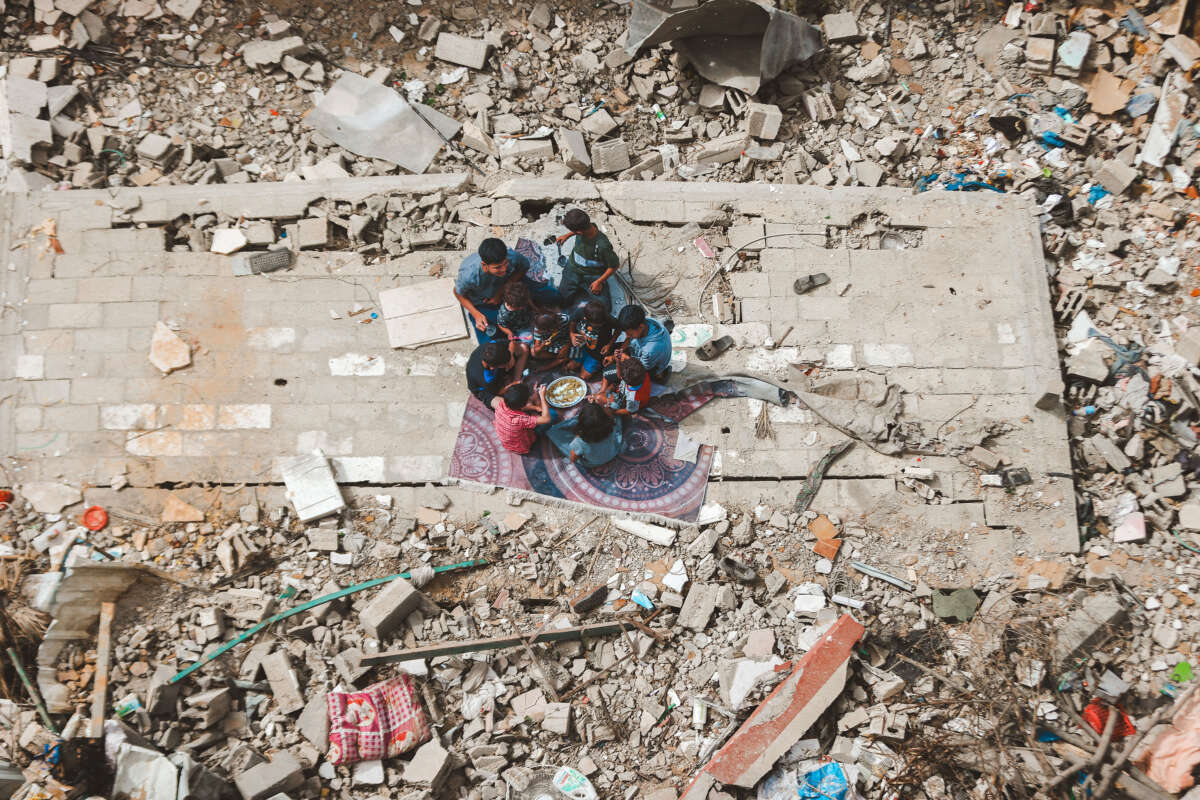Truthout is an indispensable resource for activists, movement leaders and workers everywhere. Please make this work possible with a quick donation.
Israel’s genocidal assault of Gaza has turned such a large volume of what were once homes and neighborhoods into ruins that it could take 14 years just to clear the debris, including a number of unexploded ordnance, according to a UN explosives expert.
There is currently an estimated 37 million metric tonnes, or about 41 million tons, of debris across Gaza, Iraq UN Mine Action Service Chief Pehr Lodhammar told reporters last week. This amounts to about 200 kilograms of debris for every square meter, or about 41 pounds per square foot, in Gaza on average.
It’s not possible to calculate how many unexploded bombs and munitions are in the area, but there are likely thousands of pounds of unexploded bombs currently posing a risk to civilians in Gaza who are already dodging airstrikes, disease and famine.
“We know that typically there’s a failure rate of at least 10 percent of land service ammunition that is being fired and fails to function,” said Lodhammar. “We’re talking about 14 years of work with 100 trucks.”
Unexploded ordnance are extremely dangerous. In Iraq, which relief groups say is home to the areas with the most dense contamination of unexploded ordnance and mines in the world, 700 people were killed between 2018 and 2020 by such explosives.
Israel had destroyed over half of the buildings in Gaza as of January, with cities like Khan Yunis in the south and Gaza City in the north seeing some of the worst damage. Israel’s assault has leveled entire neighborhoods, with the majority of buildings targeted and destroyed so far being residential.
The rubble has trapped the bodies of thousands of Palestinians on top of the official death toll of 35,000 people — including 14,500 children — killed and more than 77,000 people injured. Israel’s recent assault of Khan Yunis has likely increased the proportion of buildings destroyed in Gaza, with Palestinians returning to the city only to find hundreds of bodies in a mass grave at the city’s main hospital, many of them showing signs of torture and mutilated beyond recognition.
Thousands of Palestinians, forcibly displaced from their homes, have been taking shelter in other facilities, with UN Relief and Works Agency for Palestine Refugees (UNRWA) buildings, like schools, serving as makeshift residences over the past months. But these buildings are also unsafe, and the UNRWA has reported that Israel has destroyed or damaged at least 165 of their buildings in Gaza so far.
Relief workers who surveyed what is left of Khan Yunis recently described the horror of seeing how quickly families were forced to evacuate, with abandoned children’s shoes, toothbrushes, and even food left behind. UNRWA communications officer Louise Waterridge recounted seeing childrens’ graves in the yard of a UNRWA training center-turned-shelter, with one reading: “Your sister misses you.”
The lack of shelter in combination with Israel’s blockade of food, water and electricity has created a variety of risks to Palestinians’ lives, especially those of children. At least two children have died due to heat as temperatures have risen due to the changing of seasons and the climate crisis, with tents that families are sheltering in acting as “greenhouses-like structures under scorching heat,” as UNRWA Commissioner General Philippe Lazzarini said.
A terrifying moment. We appeal for your support.
In the last weeks, we have witnessed an authoritarian assault on communities in Minnesota and across the nation.
The need for truthful, grassroots reporting is urgent at this cataclysmic historical moment. Yet, Trump-aligned billionaires and other allies have taken over many legacy media outlets — the culmination of a decades-long campaign to place control of the narrative into the hands of the political right.
We refuse to let Trump’s blatant propaganda machine go unchecked. Untethered to corporate ownership or advertisers, Truthout remains fearless in our reporting and our determination to use journalism as a tool for justice.
But we need your help just to fund our basic expenses. Over 80 percent of Truthout’s funding comes from small individual donations from our community of readers, and over a third of our total budget is supported by recurring monthly donors.
Truthout’s fundraiser ends tonight! We have a goal to add 130 new monthly donors before midnight. Whether you can make a small monthly donation or a larger one-time gift, Truthout only works with your support.
